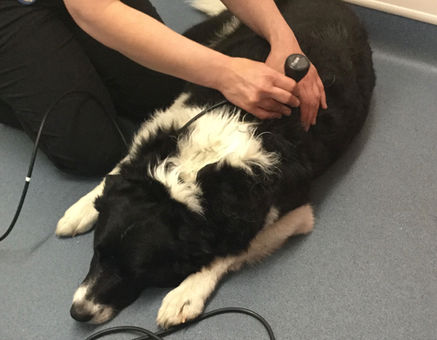Running Free Animal Physiotherapy understands the importance of animals in our lives. When your companion is injured or lame it not only causes pain and distress for them, but also for you. Running Free Animal Physiotherapy helps get them back on their paws, allowing you to get back on with your life.
Small Animal Physiotherapy and Maintenance Programmes
We can help....
Physiotherapy affects the soft tissues in the body including the muscles, ligaments and tendons. It helps to create the correct biological conditions for repair. Physiotherapy can help recovery after injury or surgery and can help offer support if the animal is suffering from a chronic condition. Physiotherapy can be beneficial for a range of orthopaedic and neurological conditions, and offer support pre- and post-operatively.
Some of the conditions that physiotherapy may help include;
-
Fractures
-
Hip and elbow dysplasia
-
Arthritis
-
Cruciate ligament injury
-
Intervertebral disc disease
-
degenerative myelopathy
Physiotherapy can have the following biological affects on the body;
-
Increased blood flow
-
Improved lymph flow
-
Removal of toxins
-
Increased soft tissue strech
-
Increased joint range of motion
-
Reduced Inflammation
-
Reduced pain
Maintenance Programmes
Running Free Animal Physiotherapy offer maintenance programmes which are specifically designed for your requirements. Maintenance programmes are flexible, you can decide when you need the sessions.
The Canine Athlete
Canine sporting activities are becoming increasingly popular, however training and competing can put a large amount of strain on the body. Injuries through repetitive strain on the joints and soft tissue are becoming more commonplace. Whatever you specialism, Agility, Flyball, Field and working trials, Canicross, Obedience, or one of the many other canine sporting activities, they all put strain on the musculoskeletal system. Sharp twists and turns, falls, running on uneven ground, jumping and sliding stops can push the body to it's limit; unsurprisingly the tissue sometimes fails, leading to injury. Injuries may be very obvious; none weight bearing of a limb or a very pronounced limp, or they may show themselves in more subtle ways. Many repetitive injuries may first show as a change in behaviour. In your sporting arena this may be shown by a reduction in performance and enthusiasm, leading to reduced scores and a stalling of your progress.
Running Free Animal Physiotherapy can help to get your partner back on their paws. By working with you and your veterinary surgeon we can help to provide the best physiological conditions to promote repair of the injured tissue. Getting your partner back in form and you out where you want to be - competing again!
Some of the most common sporting injuries that physiotherapy can help with include;
-
Muscle or tendon strain or rupture
-
Ligament sprain or rupture (including cruciate ligament injury)
-
Bone micro fracture and fractures
-
Inflammation
-
Pain and soreness
-
Carpal injury
-
"Jump down" syndrome
-
Muscle tendinopathy (inflammation of the tendon)
-
Medial shoulder syndrome
Animal Physiotherapy can help not only with the resolution of injury but can also help to prevent repetitive injury by increasing joint range of motion, muscle tone and reducing inflammation. Improving movement, body awareness and muscle conditioning all contribute to reducing the chance of repetitive strain causing injury to the sporting dog.
Running Free Animal Physiotherapy offers flexible programmes for therapy sessions to target the most common sites of injury in your sporting field, supporting your dog when they need it. Sessions can be timed to prepare your dog for the start of the season and between competitions, or during training, which can be particularly helpful when training for the next grade. Maintenance sessions will comprise of a mix of massage therapy alongside the use of physiotherapy equipment and exercises, depending on your requirements.
The senior companion
Chronic conditions such as arthritis can reduce the quality of life for our senior animals. We see changes in posture and behaviour. Your pet may be more reluctant to exercise, be unable to climb stairs, get into the car or have difficulty getting up after resting. You may also see the spine arch and their head drop forward in an attempt to take the pressure off sore joints.
Physiotherapy can be used to help relieve some of the symproms of arthritis by;
-
Reducing pain
-
Reducing muscle spasm
-
Improving joint range of motion
-
Reducing inflammation
-
Relieving secondary compensation issues
-
Improving movement
-
Building muscle
Here at Running Free Animal Physiotherapy we believe that quality of life can be improved at any age. What better way can there be to say thank you to your pet for the long years of love, loyalty and happiness, than to offer them the support and help required in their later years?
Your therapy session....
Your therapist will take a history of your pet including any current injuries or illnesses, previous injuries, ongoing veterinary treatments.
The therapist will complete a gait analysis and a “hands on” examination, looking for sore spots, heat, swelling and asymmetry. Depending on the condition the therapist will appropriately treat the area of injury and also any sites showing signs of compensatory issues.
Therapies include;
Ultrasound
Pulsed Electromagnetic Field Therapy (PEMF)
Red / blue light
Massage
Stretching
Therapy sessions are 60 minutes long.
We are unable to perform physiotherapy on any animal without veterinary approval, but don’t worry we can obtain it on your behalf. All we need is the name and contact details of your veterinary surgeon.
Please note that our physiotherapist is not qualified to diagnose and we aim to work in conjunction with your vet, so if you think your animal has an injury you must seek medical advice first.












